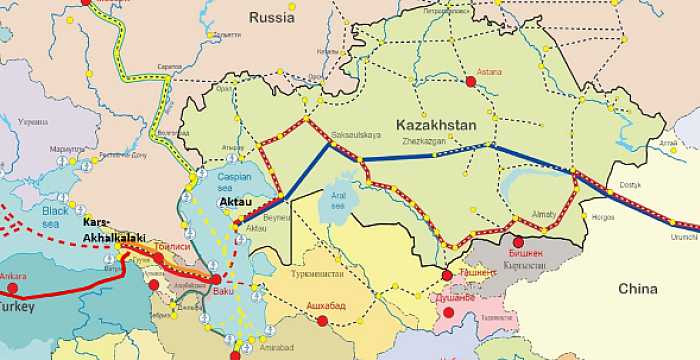The Linchpin of Ties among the Turkic Council Member States: Central Transport Corridor
The importance of the Central Transport Corridor passing through the Member States has risen owing to the developments taking place in the region and beyond. Recent events in international arena such as; increasing trade volume between China and Europe have provided new opportunities for the Turkic Council Member States in the field of transport.
Establishing a stable, integrated and seamless transport along the Central Transport Corridor passing through our countries has been the primary motivation behind the efforts spent under the Turkic Council in transport field.
Ministerial Meetings
In order to establish a high-level mechanism for improving cooperation in the field of transport, Ministers in charge of Transport of the Member States have so far held two meetings. They also signed a Joint Cooperation Protocol setting the basic principles of their relations. Besides, the Turkic Council established a Coordination Council at the level of Deputy Ministers to bring pragmatic solutions to the problems confronted by operators on the ground. The Coordination Council has met twice and performed as a problem-solving mechanism that supports cooperation in transport and acts as an intermediary body between Working Group and the Ministerial meeting.
Sister Ports
The Sister Ports MoU signed among the Ports of Baku, Aktau and Samsun brought an important dimension in the efforts in this field. The Sisters Port relations aimed at increasing the freight flow through the sister ports in the context of the ever increasing East-West trade tends to facilitate the traffic across the Caspian Sea. So far the Sister Ports convened once, the second meeting is due to be held in Baku soon. Based on the instructions of the Heads of State of the Turkic Council, Turkmenbashi Port of Turkmenistan was recently invited to the Sister Port process.
New Initiatives along the Corridor
With the purpose of phasing out the existing impediments in the way of efficient transport operations and of developing a stable, integrated and seamless transport along the Central Transport Corridor, the Member States have been working to finalize the “Agreement between the Republic of Azerbaijan, the Republic of Kazakhstan, the Kyrgyz Republic and the Republic of Turkey on the International Combined Transport of Goods”. Once entered into force, the agreement will be the first combined transport agreement in the region. Another initiative aimed at connecting the countries in the Central Transport Corridor produced the “Agreement on the Establishment of the Coordination Committee on the Development of the Trans-Caspian International Transport Route”. Signed among the Railway and Sea Port authorities of Kazakhstan, Azerbaijan and Georgia on 7 November 2013, the agreement aimed to redirect the bulk of rail transportation between Central Asia-Europe through the Caspian Sea. Through the activities of the Turkic Council Secretariat, Turkey (TCDD) acceded to the agreement on 7 November 2014. Later, China also became a party to the agreement and by the joint efforts of its Parties to the agreement a demonstration run of the first container train from Northwest China to Azerbaijan through Kazakhstan was successfully carried out. The test run took 6 days. Preparations for a second leg of the test run that will pass through Turkey for Europe are currently being conducted.
New Opportunities
Recent developments in international arena have increased the role of the Central Transport Corridor. Of all trucks departing from Turkey bound for Central Asia, 45 thousand vehicles go across Iran, 6 thousand vehicles cross Russia and 5 thousand vehicles pass through Caspian Sea, according to Mr. Fatih Şener, Chairperson of the Executive Committee of the International Freight Forwarders Association (UND).
According to the estimates, the capacity of vehicles crossing the Caspian corridor, the shortest route as compared to the other alternatives, can reach 25 thousand if necessary conditions are set such as more compatible Ro-Ro shipment fees and regularized/standardized crossings at the Caspian Sea. The Chairperson of the UND is sure that after decrease in prices the number of trucks passing through the Caspian Sea will increase in number bringing material benefit for the ports and the countries alike. This does not seem improbable taking into account the fact that Presidents promised that there would be price reduction for trucks passing through the Caspian Sea via Azerbaijan, Kazakhstan and Turkmenistan Sea ports.








